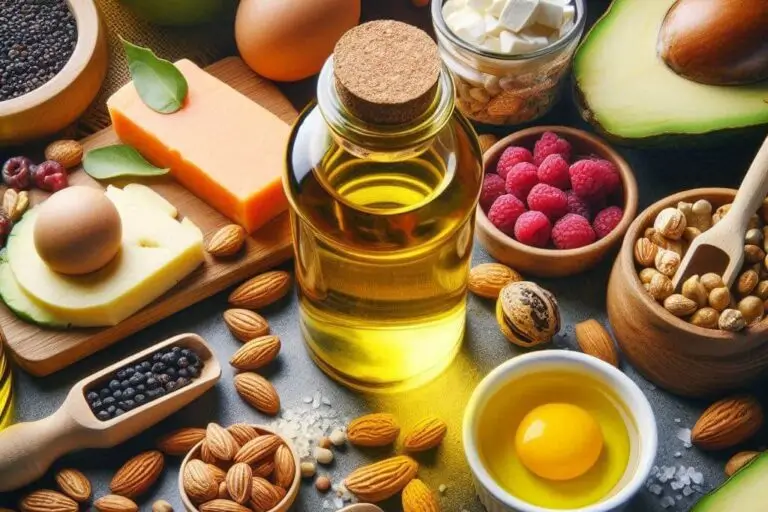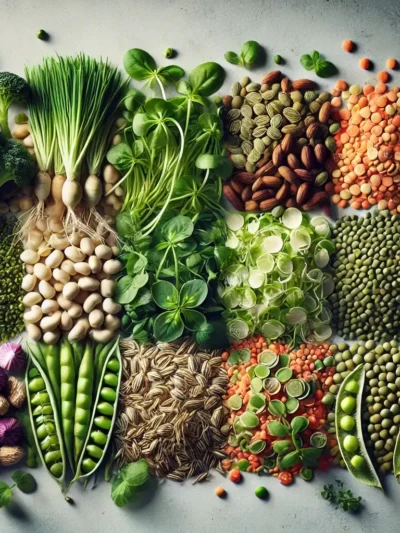To the fats, often viewed negatively, are actually essential for a balanced and healthy diet. But you need to know how to make the right choices! 🌱
They are not only sources of energy, but perform vital functions for the human body, such as the absorption of essential vitamins and the production of hormones.
The question is: what types of fats are really healthy? 🤔 And how can we integrate them in a balanced way into our daily menu? Let's answer these questions and clarify everything about fats for you!
What Are Healthy Fats? 🥑
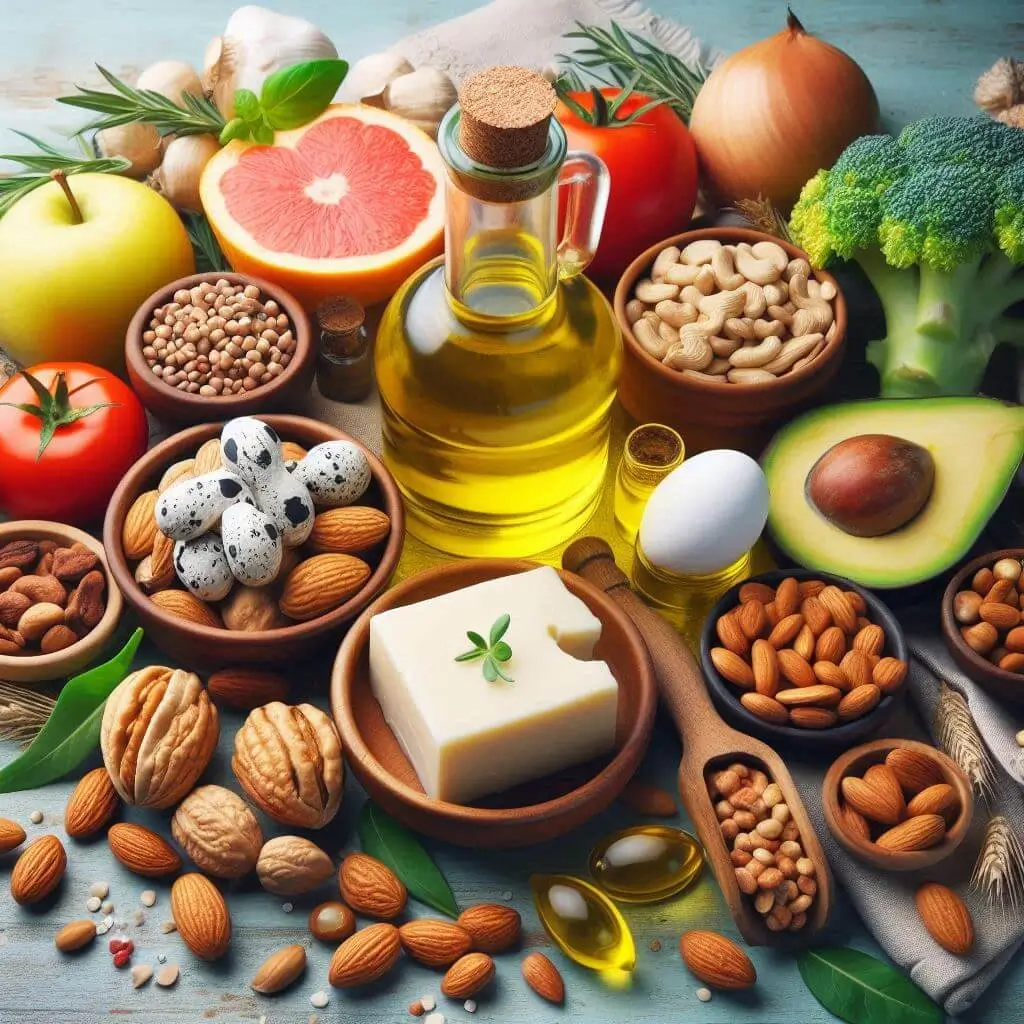
Healthy fats are those that provide benefits to the cardiovascular health, cerebral and for the maintenance of other essential functions of the body. They can be found in foods such as:
- Vegetable oils (such as olive oil and avocado oil)
- Dried fruits (such as almonds, walnuts and chestnuts)
- Avocado 🥑
- Oily fish (such as salmon, sardines and tuna)
- Seeds (such as chia, flaxseed and sesame)
These foods are rich in unsaturated fats, which help improve cholesterol levels, reduce inflammation and even control weight. 🤩
The Importance of Fats in the Human Body 🧠💓
Fats perform several essential functions for the proper functioning of our body. They are not just empty calories! Here are some of their main benefits:
- Power Source ⚡ Fats are an excellent source of long-term energy. They help the body function efficiently during prolonged physical activity, such as walking and intense training.
- Vitamin Absorption 🧴 Some vitamins, such as vitamins A, D, E and K, are fat-soluble, meaning the body needs fat to absorb these essential vitamins.
- Cellular Function 🧬 The cells of the human body are largely made up of lipids (fats), which are vital components for the formation of cell membranes.
- Heart Health ❤️ Certain fats, such as unsaturated fats, help reduce bad cholesterol (LDL) levels and improve cardiovascular health.
- Brain Health 🧠 Fats, especially essential fatty acids, are crucial for brain function. They help maintain mental health and may even help prevent neurodegenerative diseases like Alzheimer’s.
Fats: Saturated vs Unsaturated 🍗 vs 🥑
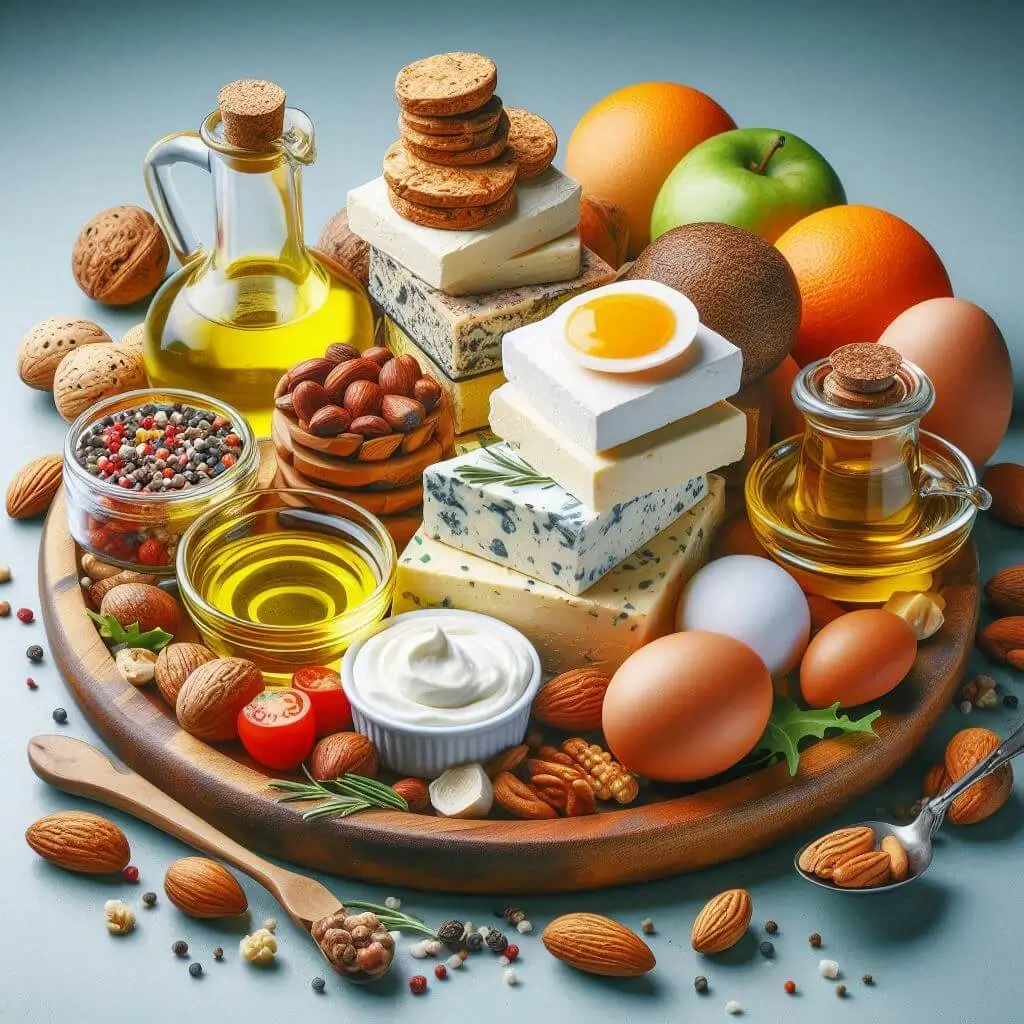
There are different types of fats, and it's important to understand the differences between them to make the right choices.
Saturated Fats 🍔
To the saturated fats are found mainly in animal products, such as red meat, dairy products, and processed foods. They can increase LDL cholesterol levels (the “bad cholesterol”) when consumed in excess, which can increase the risk of heart disease.
Sources of Saturated Fats:
- Red meat (beef, pork)
- Bacon, sausages and other processed meats
- Whole milk and dairy products (cheese, butter, cream)
- Palm oil and coconut oil
Unsaturated Fats 🥑
To the unsaturated fats are considered “good” fats. They can be monounsaturated or polyunsaturated. These fats help reduce bad cholesterol levels and increase good cholesterol (HDL), promoting cardiovascular and brain health.
Sources of Unsaturated Fats:
- Monounsaturated: Olive oil, avocado, almonds, walnuts
- Polyunsaturated: Fatty fish (salmon, sardines), flaxseed oil, chia seeds
Fat Comparison Table:
| Fat Type | Sources | Health Effects | Recommendation |
|---|---|---|---|
| Saturated | Meat, dairy, coconut and palm oil | May increase LDL (bad) cholesterol and the risk of heart disease | Consume in moderation |
| Monounsaturated | Olive oil, avocado, nuts | Lowers LDL cholesterol and improves heart health | Include regularly and in a balanced way |
| Polyunsaturated (Omega-3) | Fatty fish, flax and chia seeds | Improves brain, cardiovascular and anti-inflammatory health | Consume several times a week |
| Polyunsaturated (Omega-6) | Vegetable oils (corn, soybean), nuts | Essential for the body, but must be balanced with omega-3 | Maintain a balance between omega-3 and omega-6 |
Trans Fats: The Invisible Enemy 🚫🍟
To the trans fats are considered the worst for your health. They are found in processed and fried foods. They not only increase LDL cholesterol, but also reduce HDL cholesterol (the “good” cholesterol), contributing to the risk of heart disease, type 2 diabetes, and other health problems.
Sources of Trans Fats:
- Industrialized products (cakes, cookies, snacks)
- Fried foods and fast food 🍔🍟
- Hydrogenated margarines and vegetable creams
Therefore, it is essential to avoid foods rich in trans fats.
Health Benefits of Unsaturated Fats 🧠❤️
Unsaturated fats are extremely beneficial for the body, bringing a series of health benefits. Let's explore a little more about the benefits of unsaturated fats:
- Improved Cardiovascular Health ❤️ Unsaturated fats help lower LDL cholesterol levels and increase HDL cholesterol, which improves heart health and reduces the risk of heart disease.
- Weight Control and Metabolism ⚖️ A diet rich in unsaturated fats can help with weight control. They promote a feeling of fullness and help reduce appetite.
- Support Brain Function 🧠 Unsaturated fatty acids, such as omega-3s, are essential for brain function and cognitive development. They have anti-inflammatory effects and may help prevent neurodegenerative diseases.
- Inflammation Prevention 💥 Unsaturated fats have anti-inflammatory properties, which can be beneficial in preventing chronic diseases such as arthritis and diabetes.
Omega-3: The Superhero of Fats 🦸♂️🧠
THE omega-3 It is an essential fat, that is, the body cannot produce it and must obtain it through food. It is essential for the health of the heart, brain and immune system.
Sources of Omega-3:
- Fatty fish like salmon, sardines and tuna 🐟
- Chia and flax seeds 🌱
- Fish oil 🐠
The benefits of omega-3 are widely known and include reducing the risk of heart disease, fighting inflammation, and supporting mental health. Studies also suggest that it may help improve memory and reduce the risk of cognitive diseases such as Alzheimer's.
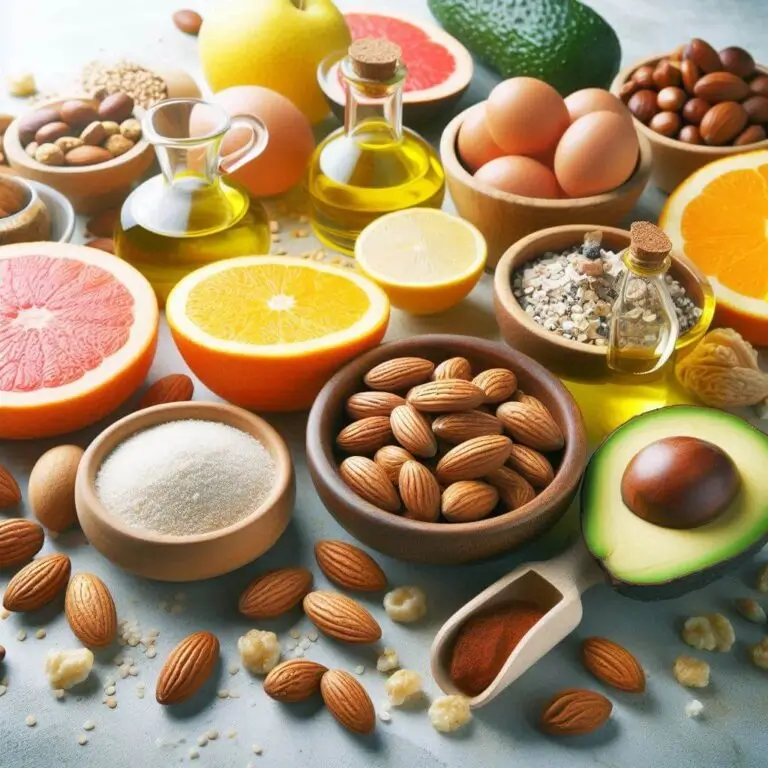
Tips for Including Healthy Fats in Your Diet 🍽️
Here are some simple tips to increase the consumption of healthy fats in your diet:
- Replace butter with olive oil in salads, stews and in the preparation of dishes.
- Add avocado 🥑 to your meals or snacks. It can be used in sandwiches, salads or even smoothies.
- Eat more fatty fish 🐟, such as salmon or sardines, at least twice a week.
- Include nuts and seeds in your snacks. Nuts, almonds and chia seeds are options rich in healthy fats.
- Avoid fried foods and processed foods, opting for healthier preparation methods, such as grilling or baking.
Conclusion 🌟
Healthy fats are essential for the functioning of our body and for a healthy balanced diet. By making conscious choices, such as replacing saturated fats with unsaturated fats and avoiding trans fats, you can improve your cardiovascular, mental and overall health.
Include sources of good fats in your diet is a great way to take care of your body, improve your energy and even prevent disease. Don't be afraid of fats — choose the right ones, and your body will thank you! 💚
Did you like the content? Share it with your friends and start including more healthy fats in your diet! 😋👨🍳
Interactive FAQ – Healthy Fats 🥑
Healthy fats are essential for the proper functioning of the body, especially monounsaturated and polyunsaturated fats, which help reduce LDL (bad) cholesterol and improve heart health. They also promote brain function and increase satiety, and are found in foods such as avocado, olive oil and fish rich in omega-3.
Good fats, such as monounsaturated and polyunsaturated fats, are beneficial to the body, helping to control cholesterol and protecting the heart. Bad fats, such as saturated and trans fats, when consumed in excess, increase the risk of heart disease and can harm overall health.
You can find healthy fats in foods like:
– **Extra virgin olive oil**
- **Avocado**
– **Nuts and chestnuts**
– **Chia and flax seeds**
– **Fish rich in omega-3**, such as salmon and sardines.
These foods help maintain heart health and improve brain function.
Not all fats make you fat! What matters is the type of fat you consume. Healthy fats, consumed in moderation, help control your appetite and improve your health. The problem lies in trans and saturated fats, which, when consumed in excess, can contribute to weight gain and health problems.
For a healthier diet, always choose **extra-virgin olive oil**, as it is obtained without heating, preserving all the antioxidants and nutrients. Use it mainly in salads or to season ready-made dishes. Avoid refined olive oils, which lose much of their properties during processing.
Omega-3 is a type of polyunsaturated fat found primarily in fish such as salmon, sardines, and tuna. It is important for cardiovascular health, reducing inflammation in the body, improving brain function, and helping to prevent diseases such as heart disease and Alzheimer's.
Saturated fat should be consumed in moderation. Foods such as red meat, whole milk, and processed foods contain saturated fat. Although your body needs small amounts of this fat, consuming too much of it can increase LDL cholesterol, which is harmful to your heart health.
Fats are essential for the absorption of fat-soluble vitamins such as A, D, E and K. These vitamins require fat to dissolve and be transported throughout the body's cells. Therefore, a balanced diet should include healthy fats to ensure effective absorption of these vitamins.
Healthy fats, especially omega-3 and essential fatty acids, are beneficial for your skin. They help keep your skin hydrated, improve elasticity, and reduce inflammation, helping to combat conditions like acne and eczema.
Yes, contrary to what many people think, healthy fats can help you lose weight. They increase satiety, which can reduce your appetite and, consequently, your calorie intake. In addition, healthy fats help balance insulin levels and improve your metabolism.
Trans fat is a type of fat that is artificially created during the hydrogenation process. It raises bad cholesterol (LDL) and lowers good cholesterol (HDL), increasing the risk of heart disease. Avoid processed foods such as fast food, packaged baked goods, and fried foods.
Foods such as margarine, filled cookies, industrial cakes and fried foods are rich in trans fats. For a healthier diet, always try to consume fresh and natural foods, preferring sources of healthy fats such as avocado, olive oil and fish.
Essential fatty acids are types of fat that the body cannot produce and therefore must be obtained through diet. Examples include omega-3 and omega-6. They play important roles in the health of the brain, heart, skin and immune system.
Yes! Healthy fats are essential for the production of hormones, such as sex hormones and hormones that regulate metabolism. Without adequate fat in the diet, hormone production can be impaired, which affects the overall health of the body.
No, fats are essential for the human body. They perform several vital functions, such as providing energy, protecting organs and aiding in the absorption of nutrients. The key is to consume the right fats, such as monounsaturated and polyunsaturated, and avoid bad fats, such as saturated and trans fats.

